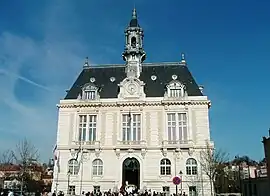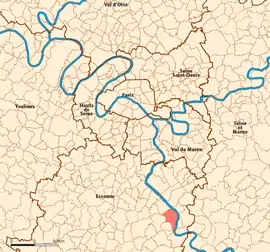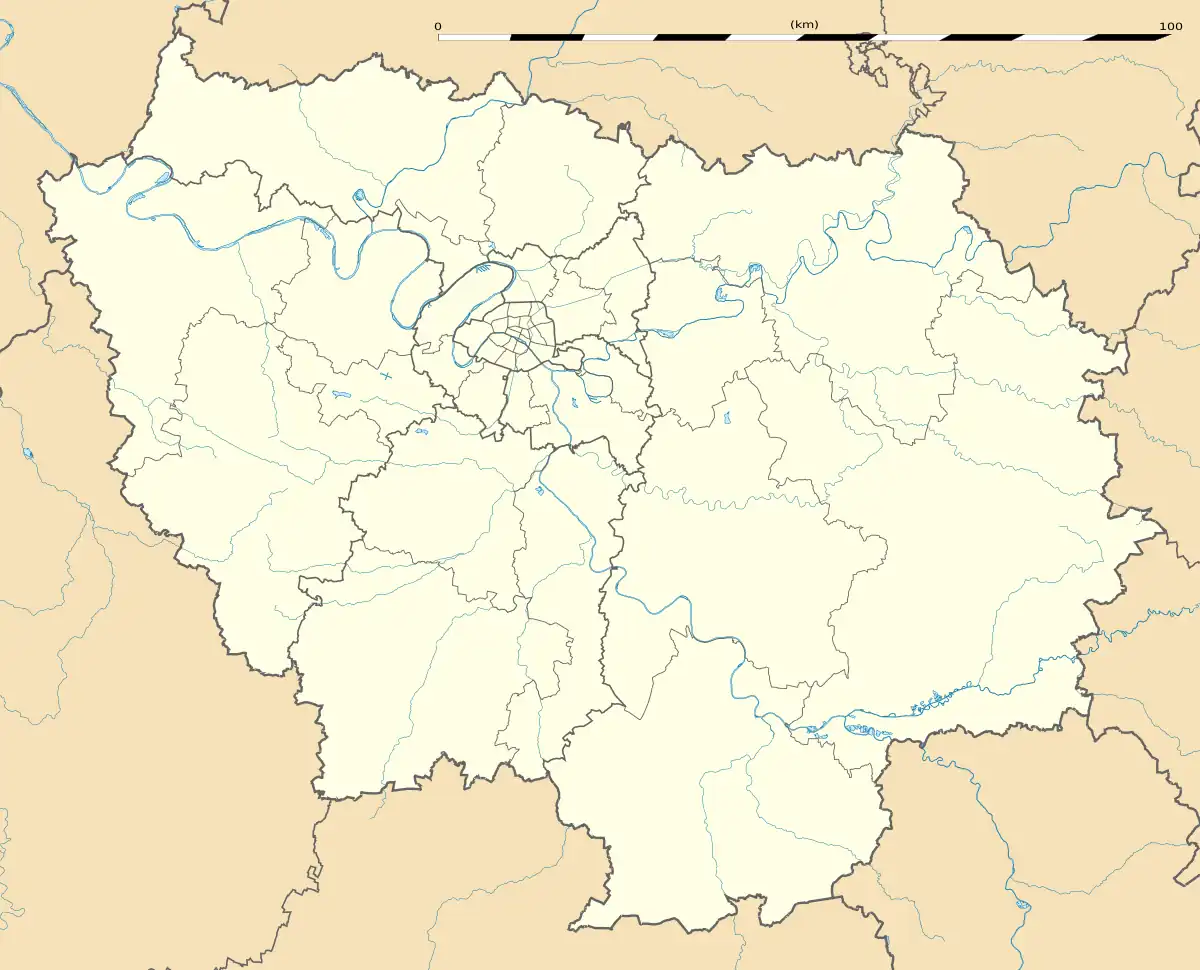Corbeil-Essonnes
Corbeil-Essonnes (French: [kɔʁbɛj ɛsɔn] ⓘ) on the River Seine is a commune in the southern suburbs of Paris, France. It is located 28.3 km (17.6 mi) from the center of Paris.
Corbeil-Essonnes | |
|---|---|
 The town Hall of Corbeil-Essonnes | |
.svg.png.webp) Coat of arms | |
 Location (in red) within Paris inner and outer suburbs | |
Location of Corbeil-Essonnes | |
 Corbeil-Essonnes  Corbeil-Essonnes | |
| Coordinates: 48°36′50″N 2°28′55″E | |
| Country | France |
| Region | Île-de-France |
| Department | Essonne |
| Arrondissement | Évry |
| Canton | Corbeil-Essonnes |
| Intercommunality | CA Grand Paris Sud Seine-Essonne-Sénart |
| Government | |
| • Mayor (2020–2026) | Bruno Piriou[1] |
| Area 1 | 11.01 km2 (4.25 sq mi) |
| Population | 52,340 |
| • Density | 4,800/km2 (12,000/sq mi) |
| Time zone | UTC+01:00 (CET) |
| • Summer (DST) | UTC+02:00 (CEST) |
| INSEE/Postal code | 91174 / |
| Elevation | 32–92 m (105–302 ft) |
| 1 French Land Register data, which excludes lakes, ponds, glaciers > 1 km2 (0.386 sq mi or 247 acres) and river estuaries. | |
Although neighboring Évry is the official seat of the Arrondissement of Évry, the sub-prefecture building and administration are located inside the commune of Corbeil-Essonnes.
History
Traces of human presence in the area date to the Palaeolithic and Neolithic ages; later it was a Gallo-Roman settlement on the main road from Paris to Sens. The name Corbeil is derived from the Latin Corbulium, from the Gaulish cor beel, meaning "holy house". Since the time of Aymon, comte de Corbeil (died 957), to the 12th century it was the chief town of a powerful county, which passed to Mauger, son of Richard I of Normandy.
William de Corbeil (died 1136) became archbishop of Canterbury, but nothing is known for certain about his parentage. The Gothic church was built in the tenth century and rebuilt in the fifteenth century. Before the expulsion of the Jews Corbeil had a flourishing Jewish community, which numbered thirteenth-century scholars Isaac ben Joseph of Corbeil and Perez ben Elijah. Peter of Corbeil (died 1222) was the teacher of Lotario de' Conti, who became pope as Innocent III.
Representatives of the king of France signed two treaties of Corbeil in the town, the Treaty of Corbeil (1258) between France and Aragon and the Treaty of Corbeil (1326) between France and Scotland.
Corbeil was besieged by the Duke of Burgundy in 1418. The Protestants of France attacked it in 1562 amidst the religious war called the First Civil War. In 1590 General Alessandro Farnese, who had come to the assistance of the Catholics in France, fought at Corbeil.
The composer Camille Saint-Saëns lived in Corbeil for some years of his youth.
The commune of Corbeil-Essonnes was created on 10 August 1951 by the merger of the commune of Corbeil with the commune of Essonnes. The commune town hall (mairie) is located in Corbeil.
Inhabitants of Corbeil-Essonnes are known as Corbeil-Essonnois.
Population
The population data given in the table and graph below for 1946 and earlier refer to the former commune of Corbeil.
|
| ||||||||||||||||||||||||||||||||||||||||||||||||||||||||||||||||||||||||||||||||||||||||||||||||||||||||||||||||||
| Source: EHESS[3] and INSEE (1968-2017)[4] | |||||||||||||||||||||||||||||||||||||||||||||||||||||||||||||||||||||||||||||||||||||||||||||||||||||||||||||||||||
Economy
In the 19th century, Corbeil-Essonnes was a centre of the flour-milling industry. Essonnes also had notable papermills.
Today, X-Fab France SAS is headquartered here and operates a semiconductor fabrication plant. The 55 hectares (0.21 sq mi) site includes 25000 square meters of cleanrooms and a design center. The fab had been founded by IBM in 1964. In 1999 it was transferred into a joint venture between IBM and Infineon, operating under the name Altis Semiconductor(fr).[5] In 2010 it was sold to Yazid Sabeg for one symbolic Euro. X-Fab acquired the assets of insolvent Altis in 2016.[6]
Safran Aircraft Engines has a plant in Corbeil.[7]
Transport
Corbeil-Essonnes is served by Corbeil-Essonnes station which is an interchange station on Paris RER line D. Corbeil-Essonnes is also served by Essonnes-Robinson station and by Moulin-Galant station on Paris RER line D.
The town is crossed by the EuroVelo 3 track.
Education
There are about 40 schools in Corbeil-Essonnes.[8]
Junior high schools:
- Collège Chantemerle
- Collège La Nacelle
- Collège Louise Michel
- Collège Saint-Spire
- Collège Sédar Senghor
Senior high schools/Sixth-form colleges:
- Lycée Robert Doisneau
- Lycée polyvalent Saint Léon
Notable people
- Nigel Atangana, footballer
- Jean-Sylvain Babin, footballer
- Dylan Bahamboula, footballer
- Demba Diagouraga, footballer
- Claude Dauphin, actor
- Damien Mozika, footballer
- Félicien Rops (1833-1898) Belgian artist and illustrator [9][10]
- Hadi Sacko, footballer
- PNL, French rappers
- MMZ, French rappers
- William de Corbeil, medieval Archbishop of Canterbury
- Walid Regragui, French-Moroccan football coach
- Breakbot, French musician, DJ and music producer
Twin towns
 Alzira, Spain, since 1991
Alzira, Spain, since 1991 Belinho e Mar (Esposende), Portugal, since 2000
Belinho e Mar (Esposende), Portugal, since 2000 Bishopbriggs, Scotland, since 1989
Bishopbriggs, Scotland, since 1989 Sindelfingen, Germany, since 1961
Sindelfingen, Germany, since 1961
See also
References
- "Répertoire national des élus: les maires" (in French). data.gouv.fr, Plateforme ouverte des données publiques françaises. 13 September 2022.
- "Populations légales 2020". The National Institute of Statistics and Economic Studies. 29 December 2022.
- Des villages de Cassini aux communes d'aujourd'hui: Commune data sheet Corbeil-Essonnes, EHESS (in French).
- Population en historique depuis 1968, INSEE
-
"Altis Semiconductor S.N.C.: Private Company Information - Businessweek". Bloomberg L.P. Retrieved 2015-12-27.
Altis Semiconductor S.N.C., a specialty foundry, provides silicon manufacturing and technology development services...
- "X-FAB to Acquire Assets of Altis Semiconductor". Erfurt: X-Fab. 2016-09-30. Retrieved 2018-01-11.
- "Safran Aircraft Engines, Evry-Corbeil".
- "Annuaire : Résultats de recherche -> Corbeil-Essonnes." French Ministry of Education. Retrieved on September 3, 2016.
- Jean Cassou (1979) The Concise Encyclopedia of Symbolism. Chartwell Books, Inc., Secaucus, New Jersey, 292 pp.
- Lee Revens and J.-K. Huysmans (1975) The Graphic Work of Félicien Rops. Léon Amiel Publisher, New York, 288 pp.
External links
- Official website (in French)
- website MJC of Corbeil-Essonnes (in French)
- Base Mérimée: Search for heritage in the commune, Ministère français de la Culture. (in French)
- Land use (IAURIF) (in English)
- Mayors of Essonne Association (in French)